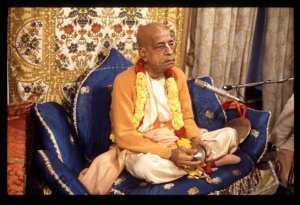CC Adi 12.35 (1975)

A.C. Bhaktivedanta Swami Prabhupada
Below is the 1996 edition text, ready to be substituted with the 1975 one using the compile form.
TEXT 35
- īśvarera dainya kari’ kariyāche bhikṣā
- ataeva daṇḍa kari’ karāiba śikṣā
SYNONYMS
īśvarera—of the Supreme Personality of Godhead; dainya—poverty; kari’—establishing; kariyāche—has done; bhikṣā—begging; ataeva—therefore; daṇḍa—punishment; kari’—giving him; karāiba—shall cause; śikṣā—instruction.
TRANSLATION
“But he has made the incarnation of Godhead a poverty-stricken beggar. Therefore I shall punish him in order to correct him.”
PURPORT
To describe a man as an incarnation of God, or Nārāyaṇa, and at the same time present him as poverty-stricken is contradictory, and it is the greatest offense. The Māyāvādī philosophers, engaged in the missionary work of spoiling the Vedic culture by preaching that everyone is God, describe a poverty-stricken man as daridra-nārāyaṇa, or “poor Nārāyaṇa.” Lord Caitanya Mahāprabhu never accepted such foolish and unauthorized ideas. He strictly warned, māyāvādi-bhāṣya śunile haya sarva-nāśa: (CC Madhya 6.169 (1975)) “Anyone who follows the principles of Māyāvāda philosophy is certainly doomed.” Such a fool needs to be reformed by punishment.
Although it is contradictory to say that the Supreme Personality of Godhead or His incarnation is poverty-stricken, we find in the revealed scriptures that when the Lord incarnated as Vāmana, He begged some land from Mahārāja Bali. Everyone knows, however, that Vāmanadeva was not at all poverty-stricken. His begging from Mahārāja Bali was a device to favor him. When Mahārāja Bali actually gave the land, Vāmanadeva exhibited His all-powerful position by covering the three worlds with three steps. One should not accept the so-called daridra-nārāyaṇas as incarnations, because they are completely unable to show the opulence of the genuine incarnations of God.